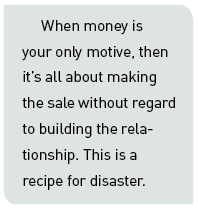HOME | ABOUT US | MEDIA KIT | CONTACT US | INQUIRE
HOME | ABOUT US | MEDIA KIT | CONTACT US | INQUIRE
 */?>
*/?>
Do you love sales? Do you love what you do? Do you love your product? Do you love your company? Do you love your customers?
These are not questions I pulled out of the air. These are questions that directly affect your productivity, your attitude, your income, your success and your fulfillment. Not to mention your longevity at your present job.
Many salespeople are reluctant to come to grips with “why” they are in sales and “why” they’re in their present job. Some will respond, “I’m in it for the money,” others will respond, “I need the money,” others will respond, “I have bills to pay and debt to overcome,” and even more will say, “I have a family.” Not many will say, “I haven’t got enough saved up to go do what I really want to do” and even fewer are willing to take the risk.
If you don’t love what you do, you’re doing no one a favor by staying in your present position. Your attitude and morale will be negative, you’ll be complaining about everything, and you’ll be blaming everyone else and their dog for your unhappiness and inadequacy.
There’s a bonus: Your boss will be all over you to increase your numbers, your customers will be upset for lack of attention and in general, you will rise—at best— to a level of mediocrity.
 What are you thinking?
What are you thinking?
Some sales people hate their jobs, but stay because they “make a lot of money.” The worst reason to keep a job is because you’re making a lot of money. When money is your motive, then it’s all about making the sale without regard to building the relationship. This is a formula for long-term disaster.
Oh, you may have some short-term success, but when you go home at night, you’ll be drowning your misery in television, beer, and in general anything but preparation for the next day.
You can even get away with it for awhile, but in the end you’ll be looking in the paper every Sunday, or posting your resume on-line hoping for a better opportunity.
It’s most interesting to me that the salespeople looking for a “better opportunity” are the very ones not looking in their own backyard (see Russell Conwell’s Acres of Diamonds for the full lesson). Most salespeople fail to realize that by building themselves into the best person they can be, that they will attract the right offers, rather than seek them.
Let me flip back to the positive side. The purpose of this article is to give you a formula that you can use to figure out if you are in the right place, or how to find the right place. Here it is: If you’re in sales and you love sales, first ask yourself, “If I could sell anything, what would I sell?”
If the answer to that question is not what you’re currently selling, therein lies part of the problem. However, this formula is not about switching jobs immediately; this formula is about becoming the best salesperson that you can in each job you commit to. If you’re going to leave a job for another job, why don’t you set the company record for most sales before you walk out the door?
Selling is a lot like running a road race: You don’t have to win the race, but you do have to achieve your personal best each time you run one.
If your numbers are low or mediocre at one place, what makes you think they will be better someplace else? You see, part of the formula is not just love what you do, it’s also possessing the skills (or dedicating yourself to getting them).
So far we’re at: What would you love to do and dedicating yourself to getting the skills to master what you love.
The third part is believing. Belief in company, belief in product, belief in service and belief in self. If you believe deeply that everything is “best,” your message will be so enthusiastically delivered that others will catch your passion. A deep self-belief will create enthusiasm and a deep self-belief will create passion.
Here’s the test: You MUST believe the customer is better off having purchased from you. And you can’t just believe it in your head—you must believe it in your heart.
The final part is internalizing your attitude. Attitude starts from within. It’s the mood you’re in when you wake up in the morning, the mood you stay in all day long and the mood you’re in when you go to bed.
But attitude is not a feeling. Attitude is a life-long dedication to the study of positive thought and the character/charisma/happiness that you display as you interact with others. If it’s not internal, it can never be external.
So there’s the formula, No, I’m not going to summarize it. If you want it bad enough, you’ll reread it. Love moves mountains—and students.